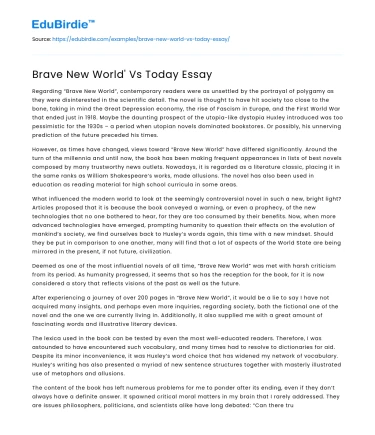Regarding “Brave New World”, contemporary readers were as unsettled by the portrayal of polygamy as they were disinterested in the scientific detail. The novel is thought to have hit society too close to the bone, taking in mind the Great Depression economy, the rise of Fascism in Europe, and the First World War that ended just in 1918. Maybe the daunting prospect of the utopia-like dystopia Huxley introduced was too pessimistic for the 1930s – a period when utopian novels dominated bookstores. Or possibly, his unnerving prediction of the future preceded his times.
However, as times have changed, views toward “Brave New World” have differed significantly. Around the turn of the millennia and until now, the book has been making frequent appearances in lists of best novels composed by many trustworthy news outlets. Nowadays, it is regarded as a literature classic, placing it in the same ranks as William Shakespeare’s works, made allusions. The novel has also been used in education as reading material for high school curricula in some areas.
Save your time!
We can take care of your essay
- Proper editing and formatting
- Free revision, title page, and bibliography
- Flexible prices and money-back guarantee
What influenced the modern world to look at the seemingly controversial novel in such a new, bright light? Articles proposed that it is because the book conveyed a warning, or even a prophecy, of the new technologies that no one bothered to hear, for they are too consumed by their benefits. Now, when more advanced technologies have emerged, prompting humanity to question their effects on the evolution of mankind’s society, we find ourselves back to Huxley’s words again, this time with a new mindset. Should they be put in comparison to one another, many will find that a lot of aspects of the World State are being mirrored in the present, if not future, civilization.
Deemed as one of the most influential novels of all time, “Brave New World” was met with harsh criticism from its period. As humanity progressed, it seems that so has the reception for the book, for it is now considered a story that reflects visions of the past as well as the future.
After experiencing a journey of over 200 pages in “Brave New World”, it would be a lie to say I have not acquired many insights, and perhaps even more inquiries, regarding society, both the fictional one of the novel and the one we are currently living in. Additionally, it also supplied me with a great amount of fascinating words and illustrative literary devices.
The lexica used in the book can be tested by even the most well-educated readers. Therefore, I was astounded to have encountered such vocabulary, and many times had to resolve to dictionaries for aid. Despite its minor inconvenience, it was Huxley’s word choice that has widened my network of vocabulary. Huxley’s writing has also presented a myriad of new sentence structures together with masterly illustrated use of metaphors and allusions.
The content of the book has left numerous problems for me to ponder after its ending, even if they don’t always have a definite answer. It spawned critical moral matters in my brain that I rarely addressed. They are issues philosophers, politicians, and scientists alike have long debated: “Can there truly be a utopia for all?”, “Should we value the community or the individual more?”, and, most importantly, “Do we choose truth or happiness?”. The incompatibility of truth and happiness, famously known as the “Red pill – Blue pill” conundrum, is particularly stressed in the final chapters of the novel when John questions Mustapha Mond about the way society is blinded by false happiness. Mustapha’s response showcased not only the World State’s shallow concept of “happiness” but also the totalitarianism that runs it. The controllers retain absolute power by mechanically conditioning the citizens’ lives to be so satisfying, that they essentially give up on their freedom and humanity.
These gripping thoughts led me to project the society module of the World State to our society today. During my research, I learned of another well-known dystopian novel that critics often compare to Huxley’s: “1984” by George Orwell. Though the two share appalling visions of the future, characters in “Brave New World” are merrily brainwashed into submission whereas those in “1984” maintain compliant under continual threats and surveillance. I believe that mankind is heading toward a more Huxleyian world than Orwellian, and with worrying speed we are. With constantly developing technologies, we now can, to some extent, also interfere with birth, condition children into certain behaviors, and receive pills, or, rather, use smartphones and entertainment, to suppress our negative feelings. Moreover, we are living in a world that promotes consumerism and exploits mass production. Conscious of it or not, we are, realizing Huxley’s prophecy of the future.
In retrospect, after in-depth studies of materials concerning “Brave New World” as well as related subjects, I felt that the frontier of my knowledge has been vastly broadened linguistically and philosophically, and my critical view of modern society has been substantially modified.






 Stuck on your essay?
Stuck on your essay?

